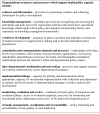Evaluating health policy capacity: Learning from international and Australian experience
- PMID: 19245704
- PMCID: PMC2657149
- DOI: 10.1186/1743-8462-6-3
Evaluating health policy capacity: Learning from international and Australian experience
Abstract
Background: The health sector in Australia faces major challenges that include an ageing population, spiralling health care costs, continuing poor Aboriginal health, and emerging threats to public health. At the same time, the environment for policy-making is becoming increasingly complex. In this context, strong policy capacity - broadly understood as the capacity of government to make "intelligent choices" between policy options - is essential if governments and societies are to address the continuing and emerging problems effectively.
Results: This paper explores the question: "What are the factors that contribute to policy capacity in the health sector?" In the absence of health sector-specific research on this topic, a review of Australian and international public sector policy capacity research was undertaken. Studies from the United Kingdom, Canada, New Zealand and Australia were analysed to identify common themes in the research findings. This paper discusses these policy capacity studies in relation to context, models and methods for policy capacity research, elements of policy capacity and recommendations for building capacity.
Conclusion: Based on this analysis, the paper discusses the organisational and individual factors that are likely to contribute to health policy capacity, highlights the need for further research in the health sector and points to some of the conceptual and methodological issues that need to be taken into consideration in such research.
Figures
References
-
- Painter M, Pierre J. Unpacking policy capacity: Issues and themes. In: Painter M, Pierre J, editor. Challenges to State Policy Capacity. Hampshire and New York: Palgrave MacMillan; 2005. pp. 1–8.
-
- Australian Institute of Health and Welfare Aboriginal and Torres Strait Islander Health Performance Framework, 2006 Report: Detailed Analyses AIHW cat no IHW 20 Canberra: AIHW. 2007.
-
- Andrews K. National Strategy for an Ageing Australia An Older Australia: Challenges and Opportunities for All. Canberra: Commonwealth of Australia; 2002.
-
- Australian Institute of Health and Welfare . Health Expenditure Australia 2002–03. Canberra: Australian Institute of Health and Welfare; 2004.
LinkOut - more resources
Full Text Sources




